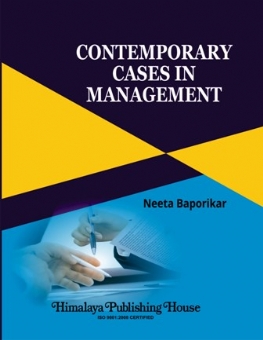Case method, the most widely used tool in management courses, is a natural vehicle for deepening our understanding of the subject matter. Management and management education, being dynamic, case method of instruction continues to evolve and adapt. The book gives a background and then provides history of case method with an introduction to case method of instruction – this is for anyone who needs to know how to use case method. Given the state of the management education arena today, this could mean just about anyone, including people that are new to management or even teaching. Corporate and worldwide cases included in this book are based on real business situations and secondary published sources of data and reports. However, the names of the organizations and the individuals described in some of the cases have been changed based on request to protect their identities. Necessary camouflage, theory and situations are added to some of the cases to make them more analytical and to ensure higher degree of learning value.
To aid better, there is a case matrix for quick access to pick out a case for teaching or learning. It is like a ready reckoner to facilitate in realizing the interdisciplinary and interrelatedness of subjects and the need to have understanding of disciplines dependency for better decision-making. Subsequent to this case matrix, there are more than 75 cases covering different areas.
Contents –
1. Air Conditioning the Restroom
2. Employees’ Indiscipline
3. Demotivated Sales Force
4. Personality
5. Motivation at Work
6. Retaining a Performer
7. Beauty Products
8. The Incident of Poison
9. Stores Catches Fire
10. Organizational Communication
11. Appraisal Systems
12. Budgeting vs. Organizational Change
13. Cultural Issues / Concepts
14. Delayed Deadlines
15. Employee Satisfaction Survey
16. Future Strategy
17. Global Gambit
18. Harvesting Training
19. Inflation Accounting
20. Judicious Strategy and Structure
21. Kaizen Issues
22. Loyal Customers
23. Marketing Strategy – Brand Management
24. New Strategic Direction
25. Owning the Market
26. Profiting from People Management
27. Globalization Development – India
28. Ethics and Social Responsibility – Saudi Arabia
29. Organizational Cultures and Diversity – Japan
30. Cross Culture Management – China
31. Motivation across Cultures – Singapore
32. Leadership across Cultures – Germany
33. General Motors Limited – Hummer
34. Microsoft Corporation
35. Toyota Corporation
36. Tata Consultancy Services
37. Bharat Sanchar Nigam Limited
38. The General Electric Company
39. Google Inc.
40. Nokia Corporation Limited
41. Ranbaxy Pharmaceuticals Limited
42. ICICI Limited
43. TATA Motors
44. Wal-Mart
45. Lonavala Chikki – Cluster Development
46. Life Insurance Corporation
47. GTB-UTI Bank Merger
48. AMUL – Diversification Strategy
49. Suzlon Limited
50. Bharti Airtel – Innovation that Matters
51. Globality Criterion
52. Oman Air: Challenges of Repositioning
53. Achelis’s – A Vision for the World of Financing
54. Real Estate – Dream Houses
55. Shell Oman Marketing
56. Health Care – Metropolis Labs
57. Essence of Enterprise
58. Sustainable Development – Carrefour
59. Ramoji Film City
60. Marketing as Enterprise
61. The Break-up Despair
62. Creating New Markets
63. Reva Electric Car Mass Production Pioneer
64. The Recall of Coke
65. Global Music Industry Crisis
66. Corporate Governance Proponent
67. People Problems Pique Bata India
68. Restructuring HP
69. Investors’ Dilemma and Buyback of Shares
70. Market Leader Capsized
71. Software Technology Parks in India
72. NTPC (Former National Thermal Power Corporation)
73. Oil and Natural Gas Commission (ONGC)
74. Launching a New Product Range
75. Partnership in Action
76. Corus Overcoming Barriers to Change
77. Business Ethics and Sustainability
Further Readings






